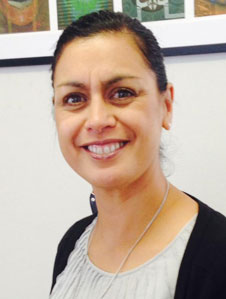 Friday 10 February 2017 11:52am
Friday 10 February 2017 11:52am
Associate Professor Suzanne Pitama
Learning Te Reo relevant to a health environment is now easy thanks to an innovative App and interactive game developed at the University of Otago, Christchurch.
The free Aki Hauora App teaches Te Reo terms commonly used in the health environment by involving participants in an interactive game. It was developed by the University of Otago, Christchurch's Māori /Indigenous Health Institute (MIHI) in partnership with the School of Māori, Pacific and Indigenous Studies (Te Tumu) in Dunedin.
MIHI director Associate Professor Suzanne Pitama says the App was designed initially as an interactive way for medical students to learn Te Reo commonly used in clinical settings.
“When Maori patients use Te Reo Māori within a clinical setting, it provides the opportunity for clinicians to engage in a deeper level of communication to support more effective assessment and management of the patient and their whanau. The more clinicians use Te Reo, the greater their own confidence and competence builds in Te Reo Māori. The App is a fun way to quickly and easily learn Te Reo relevant to clinical consultations, such as names for body parts or conditions.''
Associate Professor Pitama says Aki Hauora is a health-related version of an App developed by Professor Poia Rewi and the team at Te Tumu. Professor Rewi and his colleagues originally created Aki to develop Māori language vocabulary to assist Māori families in the early stages of their language journeys.
Players of the Aki and Aki Hauora Apps must identify and select Māori phrases in order to paddle their waka and escape a taniwha (monster).
The Aki Hauora App will be used by medical students at the University of Otago's Christchurch, Wellington and Dunedin medical schools, but is freely available to anyone interested in expanding their understanding of Te Reo. The first stages of the interactive game begin with easier words relevant to people's health such as kai (food), pakaru (broken) and moe (sleep). Later stages test players on less common words such as disease names such as mate pukupuku (cancer) and mate pāpōuri (depression).
The Aki Hauora App is available for both Apple and Android devices. Andrew Cornish of Monkeywise and Grant Baxter, an iOS App developer from AppLab Ltd and Professional Practice Fellow with the University's Department of Applied Science, developed the Aki Hauora App's technology.
For further information, contact:
Kim Thomas
Communications Manager
University of Otago, Christchurch
Ph: 027 222 6016
Email: kim.thomas@otago.ac.nz
A list of Otago experts available for media comment is available elsewhere on this website.
Electronic addresses (including email accounts, instant messaging services, or telephone accounts) published on this page are for the sole purpose of contact with the individuals concerned, in their capacity as officers, employees or students of the University of Otago, or their respective organisation. Publication of any such electronic address is not to be taken as consent to receive unsolicited commercial electronic messages by the address holder.